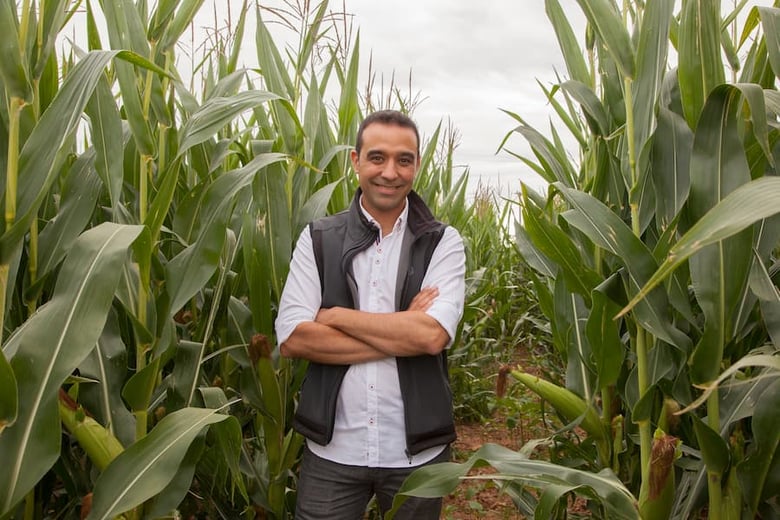Future of Sustainable Agriculture: Restoring Soil Health
Innovative agritech depends on innovative approaches. Adrián Ferrero, cofounder, and CEO of Biome Makers talks about the critical roles that soil health, data, and tech play in modern food production, and how Biome Makers’ soil testing solutions are breaking new ground.
Watch the episode below
Listen on Zencastr
https://zencastr.com/z/FRKeHqEE
Biome Makers online:
- Web: biomemakers.com
- Li: @biome-makers
- IG: @biomemakers
- TW: @biomemakers
Interview with Adrián Ferrero, CEO of Biome Makers

Dunja Jovanovic: Let’s begin with the origin of Biome Makers. What prompted you to start the company, and what does it do?
Adrián Ferrero: Our platform focuses on soil health and teaches people how to manage their soil more effectively. We decided to start this company because our previous experience involved using genetic technologies and DNA sequencing to support doctors in treating hereditary diseases. However, we realized that agriculture was missing biomarkers that could help farmers make better decisions.
In agriculture, farmers are often criticized for their use of chemical fertilizers and their negative impact on the environment. Rather than blaming them, we found out that there was a lack of information and resources available to help farmers make better decisions.
Soil is the foundation of agriculture and plays a crucial role in the growth of plants, as it houses a community of microbes such as bacteria and fungi that act as natural biosensors. Unfortunately, traditional microbial techniques could only identify 1% of the microbes in the soil, limiting our understanding of their functions and ecological relationships.
With new technologies such as DNA sequencing, we can now discover the full spectrum of microbes and their impact on plant growth. This led to the development of Biome Makers’ BeCrop Technology, a platform that utilizes DNA sequencing and advanced computing technologies to analyze soil microbes and deliver actionable insights to the farming community and stakeholders in agriculture value chains.
Since our inception in California in 2015, we have amassed the largest database of soil microbial references with a profile of 14 million taxonomic units, highlighting the vast discoveries we are making underground.
DJ: Talk about your first successful project — how did that put you on the map?
AF: The one that put us on the map was working on a single crop to prove the value of our functional insights on soil, which happened to be the wine industry. We began the project in Napa Valley, a well-known region in California. We worked with high-end wineries, conducting pilots, and collecting soil samples to understand how the microorganisms were impacting them.
We also explored the connection between the winemaking process and soil quality. After completing this initial project in Napa Valley, we expanded to other crops and now work with 180 different crops. Our insights are crop-specific, especially when it comes to risk disease and nutritional pathways.
We analyze how the soil mobilizes other nutrients to make them available to plants, similar to how the gut microbiome works. These insights are stored in our database and are used to inform our work with different crops.
DJ: What are the benefits of regenerative agriculture compared to traditional agriculture?
AF: Regenerative agriculture is a mindset change that challenges traditional concepts in agriculture. Over the last sixty years, we have relied heavily on synthetic fertilizers and genetics to increase yields dramatically.
This approach is not sustainable — as it damages the natural fertility of the soil, leading to a higher dependency on inputs and declining productivity. To maintain field productivity and reduce dependency on certain inputs, we need to adopt regenerative practices that integrate traditional practices with modern agriculture. Regenerative agriculture is not just a label, but a mindset on how we approach farming in a more integrative way.
DJ: Can you give an example of a farm or organization that’s used your technology to change its practices?
AF: One of our North American clients was experiencing a low fertility efficiency rate of 35-45%, indicating that only a small fraction of the fertilizer they applied was actually reaching the plants.
After analyzing their soil and identifying certain blocked pathways, they introduced a biological amendment that restored the balance in the soil and activated important pathways. As a result, their fertility efficiency increased by 1.2%, leading to a significant economic boost for their corn crop.
Also, we have been collaborating with farmers in Latin America to promote environmentally friendly practices by leveraging natural processes and traditional farming methods. Our trustworthy rating system, which is based on the biological quality of the soil, assesses the sustainability and responsibility of farmers' practices.
Food companies are also utilizing this rating system to incentivize and reward farmers who invest in regenerative agriculture, ultimately distinguishing their crops and end products in the market.
DJ: Can you talk about the industry and the challenges facing these kinds of innovations?
AF: There are many. Adoption is one of them. It's evident that people are eager to explore new tools and technologies that can help them overcome their challenges. Initially, we had to introduce and create awareness about our completely new technology and tools and push the market to create demand. But now we see that the situation has reversed, and people are approaching us with prior knowledge of our work.
Therefore, it can be said that people are receptive to adopting clean tech. Nevertheless, the main challenges are feasibility from an economic standpoint and education. We frequently encounter agronomists who lack proper training in managing soil biology, which is why we have initiated a training program for BeCrop Advisors (BCAs) to enable them to utilize our insights effectively.
We came to the realization that sharing our knowledge and experiences with clients on what has worked for them in certain situations and what hasn't in others could be beneficial. By doing so, we could crowdsource knowledge and create a space for best practices in soil management.
Education and feasibility are some of the challenges we face. When introducing a new tool, there may be doubts about its return on investment. Fortunately, in agriculture, people tend to test the technology first and assess its value before committing to it. Once they see the benefits of using this layer of data, they continue to use it and spread the word about clean tech to others in the industry.
DJ: What other challenges do you see in the cleantech industry?
AF: The challenges we face in addressing climate change are quite broad, particularly because we use carbon as a metric rather than carbon sequestration. It can be difficult to measure the actual tons of carbon being sequestered, especially as greenhouse gases are not solely made up of carbon.
Researchers have found correlations between other gases and carbon metrics, which is beneficial. For example, methane is 25 times more polluting than carbon dioxide, and nitrous oxide — which is one of the main greenhouse gases emitted in farming practices — is 300 times more polluting than carbon dioxide. This is also linked to the efficiency of nitrogen management in the field.
If we can activate the biological activity of nitrogen in the field and increase fertility efficiency for plants, we can reduce the release of nitrous oxide, which has a significant impact on greenhouse emissions.
DJ: When you were first starting out, did you think about what kind of identity and what kind of brand you wanted Biome Makers to have?
AF: While entrepreneurs typically have a well-defined plan that they present to investors, it's important to leave some room for adjustments and improvements based on new information and changing circumstances. Despite having a clear path to follow, decisions should be made based on how the world is evolving and the data available at the time.
In our case, we aimed to create a profitable company with a mission to improve agriculture through smarter and more efficient practices, using our knowledge of technology and science.
DJ: What role do you think marketing has in your success?
AF: I would say that marketing has been a major factor in our success, accounting for about 60% of it since the beginning.
The initial impression that people have of our company is crucial — and this is where marketing plays a key role. Creating awareness is equally important, which is again a marketing task. With so many things happening, such as collaborations, technological advancements, success stories, and partnerships, there is always something to talk about.
The challenge is that there is an overwhelming amount of content out there, and not all of it is useful. Some content is purely for entertainment, while other content is more educational or informative, and it can be difficult to stand out.
I have been extremely grateful for the support we have received from accelerators, innovators, mentors, friends, and partners who have introduced us to others along the way. I have found podcasts like yours to be invaluable in spreading the word about our work.
DJ: How did you communicate your mission and your purpose, and how has that changed over time?
AF: In the highly competitive market, startups face the challenge of gaining credibility and trust among customers. Many companies promise a lot but fail to deliver a reliable product. As a startup, it's crucial to be perceived as trustworthy, solid, and consistent.
To achieve this, we've been focused on technical communication — which is more science-driven — to show that our product has solid scientific backing. We've showcased our collaborations, projects, and scientific publications that support our technology. Public exposure and effective communication are crucial for gaining credibility in the market. We believe that pursuing excellence is key, and everything we do is because we believe it's good enough.
DJ: Can you share your thoughts on whether your technology will be a significant player in agriculture in the future, or if it will be the future of agriculture?
AF: Collaboration and the combination of different technologies are crucial to achieving our common goals. Our company's focus is on understanding soil dynamics and managing soil more efficiently, but there are many other innovative technologies out there that will also be instrumental in shaping the future of agriculture.
We firmly believe that individuals alone cannot change the world, but working together can have a chain effect and make a huge difference. Our goal is to contribute to a more responsible approach to food production and consumption through our cleantech approach, although we recognize that this is just one aspect of the larger agricultural supply chain.
DJ: What are your hopes for the future of sustainability in the food industry?
AF: In the upcoming years, the economic landscape will be crucial, and we may need to alter our perception of consumption and work. In the past, we've been accustomed to having an abundance of goods at our fingertips and disposing of what we don't want without much thought.
However, this is not a sustainable practice if we want to protect the planet and ensure its well-being for future generations. We must consider the preservation of human life on Earth for many generations to come.
DJ: We need to evolve the way we consume and how we manage waste —
AF: At present, approximately 30% of food is lost before it even arrives at the supermarket, and I think there is still a significant amount of waste within the supermarket itself. As I stroll through the aisles and observe the large quantities of fresh food being purchased, particularly meat, it's evident that people cannot consume it all, and that it will go to the trash.
It's my hope that we will be intelligent enough to adapt our consumption habits and care for the finite resources we have available to us.



